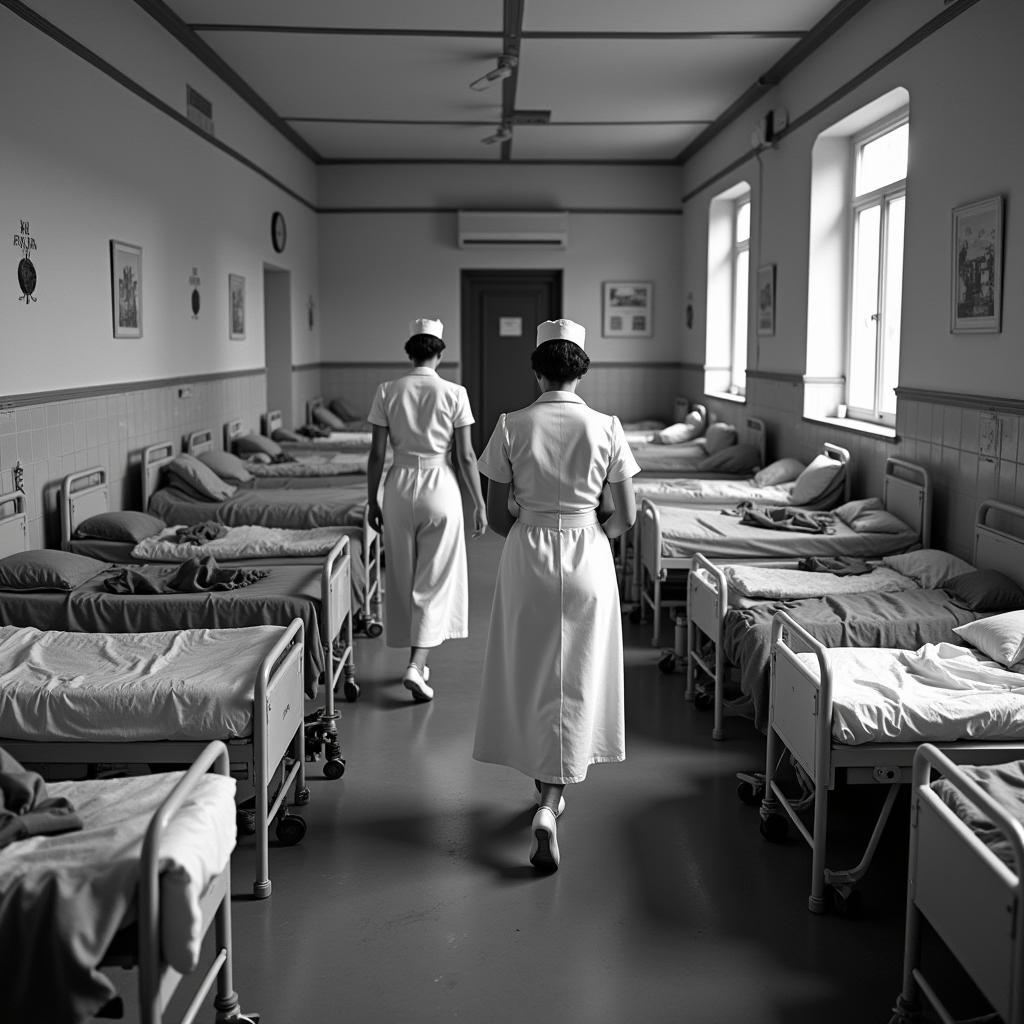The impact of Ww1 Hospitals resonates even today, shaping modern medical practices and leaving behind stories of resilience and innovation. These vital centers played a crucial role in providing care for countless wounded soldiers amidst the chaos and devastation of the Great War. From rudimentary field hospitals to specialized facilities further from the front lines, understanding their history offers a poignant glimpse into the challenges and triumphs of wartime medicine.
The Crucial Role of WW1 Hospitals: A Look Back
WW1 marked a turning point in medical history, with significant advancements driven by the sheer necessity of treating a vast number of casualties. Trench warfare resulted in horrific injuries, demanding innovative solutions and pushing medical professionals to their limits. Hospitals, often overwhelmed by the influx of wounded, became centers of both suffering and hope.
Challenges Faced by WW1 Medical Staff
WW1 medical staff encountered unprecedented challenges. Limited resources, rudimentary equipment, and the constant threat of infection made treating injuries incredibly difficult. The sheer scale of the devastation, coupled with the psychological trauma experienced by both patients and medical personnel, added another layer of complexity to their work. Imagine working tirelessly in a field hospital, surrounded by the constant groans of the injured, with limited access to pain relief and antibiotics.
Innovations Born from Necessity
Despite the harrowing conditions, WW1 hospitals were also crucibles of medical innovation. The urgent need to treat new types of injuries spurred the development of new surgical techniques, and the widespread use of blood transfusions became a life-saving practice. The war also saw advancements in prosthetics and rehabilitation, helping countless soldiers rebuild their lives after suffering debilitating injuries. What might have seemed impossible in peacetime became achievable in the face of wartime necessity.
The Development of Specialized Hospitals
As the war progressed, specialized hospitals emerged, catering to specific types of injuries and illnesses. These facilities focused on areas such as reconstructive surgery, orthopedics, and the treatment of shell shock – a condition now recognized as PTSD. This specialization allowed for more focused care and contributed significantly to improving patient outcomes.
 WW1 Nurses: Nurses providing care and comfort to wounded soldiers in a hospital ward.
WW1 Nurses: Nurses providing care and comfort to wounded soldiers in a hospital ward.
The Enduring Legacy of WW1 Hospitals
The legacy of WW1 hospitals extends far beyond the war itself. The lessons learned, the innovations developed, and the unwavering dedication of the medical personnel shaped the landscape of modern medicine. From triage systems to advancements in surgical techniques, the impact of these wartime experiences can still be seen in hospitals today.
The sacrifices and resilience demonstrated within the walls of WW1 hospitals serve as a powerful reminder of the human cost of war and the enduring importance of compassionate medical care.
Conclusion: Remembering the Significance of WW1 Hospitals
The story of WW1 hospitals is a story of both immense suffering and remarkable progress. By understanding the challenges faced and the innovations born from necessity, we gain a deeper appreciation for the advancements in medical care that we benefit from today. The legacy of these vital institutions continues to inspire and inform medical practices worldwide, ensuring that the lessons learned from the Great War are never forgotten.
FAQ
- What were the typical conditions like in a WW1 field hospital?
- What were some of the most significant medical advancements that came out of WW1?
- How did WW1 hospitals contribute to the development of modern trauma care?
- What were the primary challenges faced by medical staff in WW1 hospitals?
- How did the treatment of psychological trauma evolve during WW1?
- What role did women play in WW1 hospitals?
- How did the experiences of WW1 hospitals influence medical training and education?
Need support? Contact us at Phone Number: 02437655121, Email: [email protected] Or visit us at: Số 298 Đ. Cầu Diễn, Minh Khai, Bắc Từ Liêm, Hà Nội, Việt Nam. We have a 24/7 customer service team.